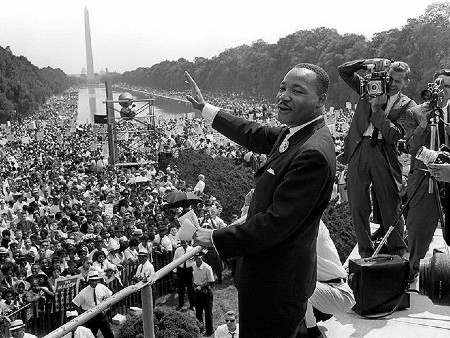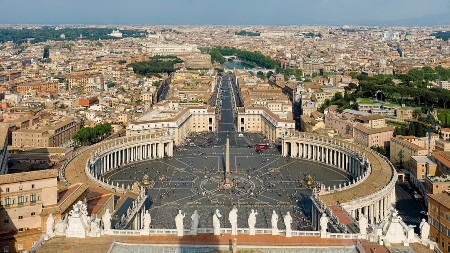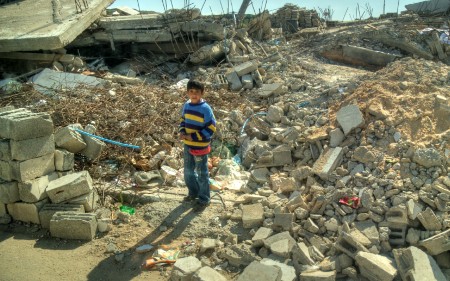Cardinal Calls Poverty a Moral Problem
FREE Catholic Classes
In the struggle against poverty, it is necessary that Catholic organizations "know well" the social doctrine of the Church, because the object of this doctrine is and will always be the sacred dignity of man, made in the image of God.
Highlights
GUADALAJARA, Spain (Zenit) - Poverty is a problem posed to humanity's moral conscience, and cannot be explained solely from the material point of view, says the president of the Pontifical Council for Justice and Peace.
Cardinal Renato Martino affirmed this Friday in an address in Guadalajara, Spain, on the occasion of the 50th anniversary of the Spanish nongovernmental organization "Manos Unidas" (United Hands).
Referring to Benedict XVI's message for this year's World Day of Peace, the cardinal explained that poverty "is not only of the material and quantitative type," adding that "material poverty never explains, on its own, the immaterial poverties; rather, the opposite is true."
Cardinal Martino stressed the moral "knots" in which poverty is tied up at present, which the Pope highlighted in his message: abortion, the fight against AIDS, children, disarmament and the food crisis.
Speaking on the issue of demographic growth, the Vatican official explained that the promotion of abortion in poor countries is "the most unjust of the many expressions of that dissimulated and malevolent strategy of wanting to overcome poverty by eliminating the poor."
It is a "dangerous strategy," he said, which consists in "using authority to lessen the number of guests rather than multiplying the bread to be shared."
Addressing the topic of poverty and pandemics, especially AIDS, Cardinal Martino called for "greater and more exact consideration of the intrinsic moral implications that such a relationship entails."
He underlined two ethical points for the fight against illness in poor countries. It is necessary, he said, "to make medicines and necessary care available to poor people, reconsidering the system of patents through the assumption of responsibility by the international community, to guarantee all men and women the necessary basic health care." He also called on the global community to "hasten educational campaigns for a sexuality that responds fully to the dignity of the person."
The cardinal reminded his listeners that "everything that weakens the family causes harm that is discharged on children; where the dignity of woman and motherhood is not promoted, the dignity of boys and girls is also wounded."
Addressing the topic of disarmament, he explained that "the material and human resources used in military expenditures and armaments are subtracted from nations' development projects, especially from the poorest and most in need of aid."
He affirmed that the food crisis "is characterized not by the insufficiency of food, but by the lack of a network of political and economic institutions capable of addressing needs and emergencies."
At the world level, he said, the most serious problem is "the increase of the inequality between rich and poor," because "of the technological change" and "the price dynamics of industrial products, which increases more rapidly than the price of the goods and services produced by the poorest countries."
Moral struggle
Cardinal Martino stressed that the struggle against poverty, far from implying an increase of material aid, entails a "moral change." He highlighted the need to "rediscover the natural law, namely, the shared ethical code that gives meaning to the common commitment to build peace."
He also mentioned the need to renew the norms that govern international trade, especially the abrogation of "protective, unjust and anachronistic measures" used by industrialized countries, as well as the establishment of a "culture of cooperation" among the poor countries.
Addressing the present economic crisis, the cardinal clarified once again that it is "an ethical problem," and that it is necessary to change "the mentality that reigns in financial activities, all based on self-reference and short-term gain," and to place it in "the perspective of the common good."
He emphasized the importance of putting the person at the center of the economy. He affirmed, "The problems of development, aid and international cooperation are often resolved without really involving people, but only as questions of predisposition of mechanisms, of specifying tariff agreements, of accreditation of anonymous financing, while, on the contrary, the struggle against poverty needs men and women who live fraternity profoundly, who are able to support individuals, families and communities in endeavors of genuine human development."
He continued: "It is impossible to help the poor if they are seen only as part of a balance sheet of costs and benefits, as numbers and, in the end, as problems."
Social doctrine
In the struggle against poverty, it is necessary that Catholic organizations "know well" the social doctrine of the Church, because the object of this doctrine is and will always be the sacred dignity of man, made in the image of God, and the safeguarding of his inalienable rights, explained the cardinal.
Social doctrine's basis, he affirmed, is "the truth about human nature itself, truth understood by reason and enlightened by revelation, its moving force, love as evangelical precept and norm of action."
The cardinal stated that the Church, in offering her social teaching, "does not limit herself to offer principles for reflection, orientations, guidelines, observations or appeals, but she also presents norms of judgment and guidelines for action that every Catholic is called to put at the base of his prudent experience, to translate it later and concretely into efficacious categories of collaboration and commitment."
He added: "The light of the truth of man, created by God and redeemed by Christ, is an answer to one of the greatest weaknesses of contemporary society: the inadequate vision of man." This vision, he said, "must differentiate a Catholic NGO from those nongovernmental organizations that are also dedicated to the struggle against extreme poverty and hunger."
Join the Movement
When you sign up below, you don't just join an email list - you're joining an entire movement for Free world class Catholic education.

-

-
Mysteries of the Rosary
-
St. Faustina Kowalska
-
Litany of the Blessed Virgin Mary
-
Saint of the Day for Wednesday, Oct 4th, 2023
-
Popular Saints
-
St. Francis of Assisi
-
Bible
-
Female / Women Saints
-
7 Morning Prayers you need to get your day started with God
-
Litany of the Blessed Virgin Mary
Daily Catholic
 Daily Readings for Thursday, January 16, 2025
Daily Readings for Thursday, January 16, 2025 St. Fursey: Saint of the Day for Thursday, January 16, 2025
St. Fursey: Saint of the Day for Thursday, January 16, 2025 Prayer for a Blessing on the New Year: Prayer of the Day for Tuesday, December 31, 2024
Prayer for a Blessing on the New Year: Prayer of the Day for Tuesday, December 31, 2024- Daily Readings for Wednesday, January 15, 2025
- St. Paul the Hermit: Saint of the Day for Wednesday, January 15, 2025
- St. Theresa of the Child Jesus: Prayer of the Day for Monday, December 30, 2024
![]()
Copyright 2024 Catholic Online. All materials contained on this site, whether written, audible or visual are the exclusive property of Catholic Online and are protected under U.S. and International copyright laws, © Copyright 2024 Catholic Online. Any unauthorized use, without prior written consent of Catholic Online is strictly forbidden and prohibited.
Catholic Online is a Project of Your Catholic Voice Foundation, a Not-for-Profit Corporation. Your Catholic Voice Foundation has been granted a recognition of tax exemption under Section 501(c)(3) of the Internal Revenue Code. Federal Tax Identification Number: 81-0596847. Your gift is tax-deductible as allowed by law.







 Daily Readings for Thursday, January 16, 2025
Daily Readings for Thursday, January 16, 2025 St. Fursey: Saint of the Day for Thursday, January 16, 2025
St. Fursey: Saint of the Day for Thursday, January 16, 2025 Prayer for a Blessing on the New Year: Prayer of the Day for Tuesday, December 31, 2024
Prayer for a Blessing on the New Year: Prayer of the Day for Tuesday, December 31, 2024


